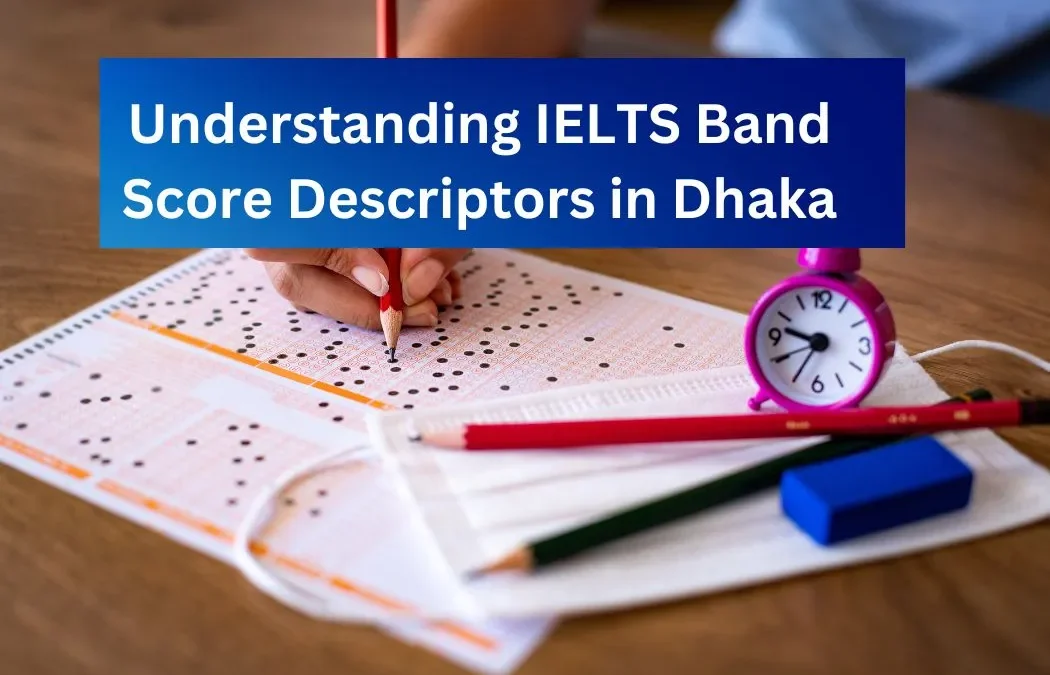If you are planning to take the IELTS exam in Dhaka, understanding the IELTS Band Score Descriptors is crucial for your success. At LIAKATS, we specialize in helping students achieve their desired IELTS band scores by breaking down the descriptors and guiding them through effective preparation. Whether you’re aiming for a high score in Listening, Reading, Writing, or Speaking, knowing what each band score represents is the first step toward achieving your goal.
What Are IELTS Band Score Descriptors?
IELTS Band Score Descriptors are the criteria used to assess a candidate’s proficiency in the English language. Each band score, ranging from 1 to 9, represents a specific level of ability across four sections of the exam: Listening, Reading, Writing, and Speaking. The band scores reflect how well you understand and use English in various contexts.
At LIAKATS, we focus on helping students understand these descriptors in detail to ensure they meet the required benchmarks for their targeted score. For those in Dhaka, having access to the best IELTS coaching center means you’ll have a clear understanding of what examiners are looking for at each band level.
The Importance of Band Score Descriptors in Your IELTS Preparation
When preparing for the IELTS exam, many students in Dhaka overlook the importance of band score descriptors. These descriptors guide how your performance is judged and ultimately determine your overall band score. Understanding the specific criteria for each band helps you tailor your preparation and improve in areas where you need the most work.
Band Scores Breakdown
- Band 9 (Expert User): The test-taker fully operational in English, with complete understanding and fluency. No significant mistakes.
- Band 8 (Very Good User): Fully functional in English with occasional inaccuracies. Handles complex arguments well.
- Band 7 (Good User): Has an operational command of English with occasional errors. Generally good at complex language use.
- Band 6 (Competent User): Effective English use but with some inaccuracies.Able to manage simple conversations in comfortable settings.
- Band 5: Moderate User: Some proficiency in the language.
- Band 4 (Limited User): Basic competence in familiar situations but frequent issues with comprehension and language structure.
- Band 3 (Extremely Limited User): Can only convey and understand general meaning in very familiar situations. Communication breakdown is frequent.
- Band 2 (Intermittent User): Faces significant difficulty understanding and using English, except for the most basic expressions.
- Band 1 (Non-User): No ability to use the language except for a few isolated words.
Knowing the difference between each band helps you set realistic goals and focus on the areas you need to improve to reach your desired score.
Understanding the Descriptors for Each Section
Let’s break down the IELTS band score descriptors for each of the four sections of the exam: Listening, Reading, Writing, and Speaking.
1. Listening Band Score Descriptors
The Listening section is graded based on how well you understand spoken English in a variety of contexts, from everyday conversations to academic lectures. Higher band scores (7 and above) require a near-native level of comprehension, with the ability to understand subtle details and speaker attitudes.
For candidates aiming for Band 9, you need to be able to follow speech on unfamiliar topics without any difficulty. Band 6 candidates, on the other hand, are expected to follow the main ideas in spoken English but may struggle with complex vocabulary or rapid speech.
2. Reading Band Score Descriptors
Reading scores are based on your ability to understand written English, ranging from factual information to complex ideas in academic texts. Higher bands demonstrate an ability to skim, scan, and understand the deeper meaning behind the texts.
In the Reading section, a Band 8 or 9 means you can fully comprehend long passages of text, including complex vocabulary and arguments. A Band 6 reader can understand the general meaning but may misinterpret nuances or struggle with academic jargon.
3. Writing Band Score Descriptors
The Writing section is one of the most challenging parts of the IELTS exam, and the band score descriptors focus on your ability to express ideas clearly and coherently. Your score is determined by several factors, including task achievement, coherence, grammar, and vocabulary.
For example, to achieve a Band 7 or 8, you must not only answer the question directly but also structure your essay logically, with varied sentence structures and a good range of vocabulary. Band 6 candidates typically show a good attempt at answering the question but may lack complexity in their language use or make frequent grammatical errors.
4. Speaking Band Score Descriptors
The Speaking section is scored based on your fluency, pronunciation, grammar, and vocabulary. Candidates who achieve a high band score can speak fluently with minimal pauses, use a wide range of vocabulary, and produce accurate sentences.
To reach Band 8 or 9, you need to communicate effectively on complex topics, express opinions clearly, and handle unfamiliar questions without hesitation. Band 6 candidates are typically able to discuss familiar topics but might struggle with fluency when discussing more abstract or complex issues.
Strategies for Improving Your Band Score
At LIAKATS, we provide detailed strategies to help you improve your IELTS band score in each section. By understanding the band score descriptors and tailoring your practice to meet these benchmarks, you can target specific weaknesses and improve your overall performance.
1. Focused Practice on Weak Areas
One of the key strategies we use at LIAKATS is focused practice on areas where students need the most improvement. Whether it’s listening for detail, reading complex passages, writing coherent essays, or speaking fluently, identifying and working on your weak points is essential for improving your band score.
2. Simulating Exam Conditions
Practicing under exam conditions is another effective strategy. In order to prepare for the actual IELTS examination, we regularly hold practice exams. This helps students become familiar with the test format and manage their time effectively during the actual exam.
3. Feedback and Error Analysis
Receiving feedback from experienced instructors is crucial for improvement. At LIAKATS, we provide detailed feedback on your performance, pointing out mistakes and areas for improvement. This feedback is essential for refining your skills and moving up the band score scale.
Why Choose LIAKATS for IELTS Coaching in Dhaka?
LIAKATS is the best IELTS coaching center in Dhaka because of our proven approach to helping students achieve their desired IELTS band scores. We focus on personalized learning, detailed feedback, and a comprehensive understanding of IELTS band score descriptors to ensure our students are fully prepared for their exam.
Our team of expert instructors is dedicated to helping you understand what the examiners are looking for and how to meet those expectations in each section of the test. With our tailored approach to IELTS preparation, we ensure that you get the support you need to succeed.
If you’re preparing for the IELTS, it’s essential to understand the format and requirements of each section. Our comprehensive guide on the IELTS Speaking Test Online in Bangladesh provides valuable insights and tips to help you excel.
Conclusion
Understanding IELTS Band Score Descriptors is crucial for achieving your desired score on the IELTS exam. At LIAKATS, we help students in Dhaka navigate these descriptors, providing targeted preparation that aligns with their goals. Whether you’re aiming for a Band 7 or higher, understanding the requirements for each band score is essential for success. With the right preparation and guidance, you can confidently take the IELTS exam and achieve your desired band score.
At LIAKATS, the best IELTS coaching center in Dhaka, we are here to support you every step of the way in your IELTS journey.


Recent Comments